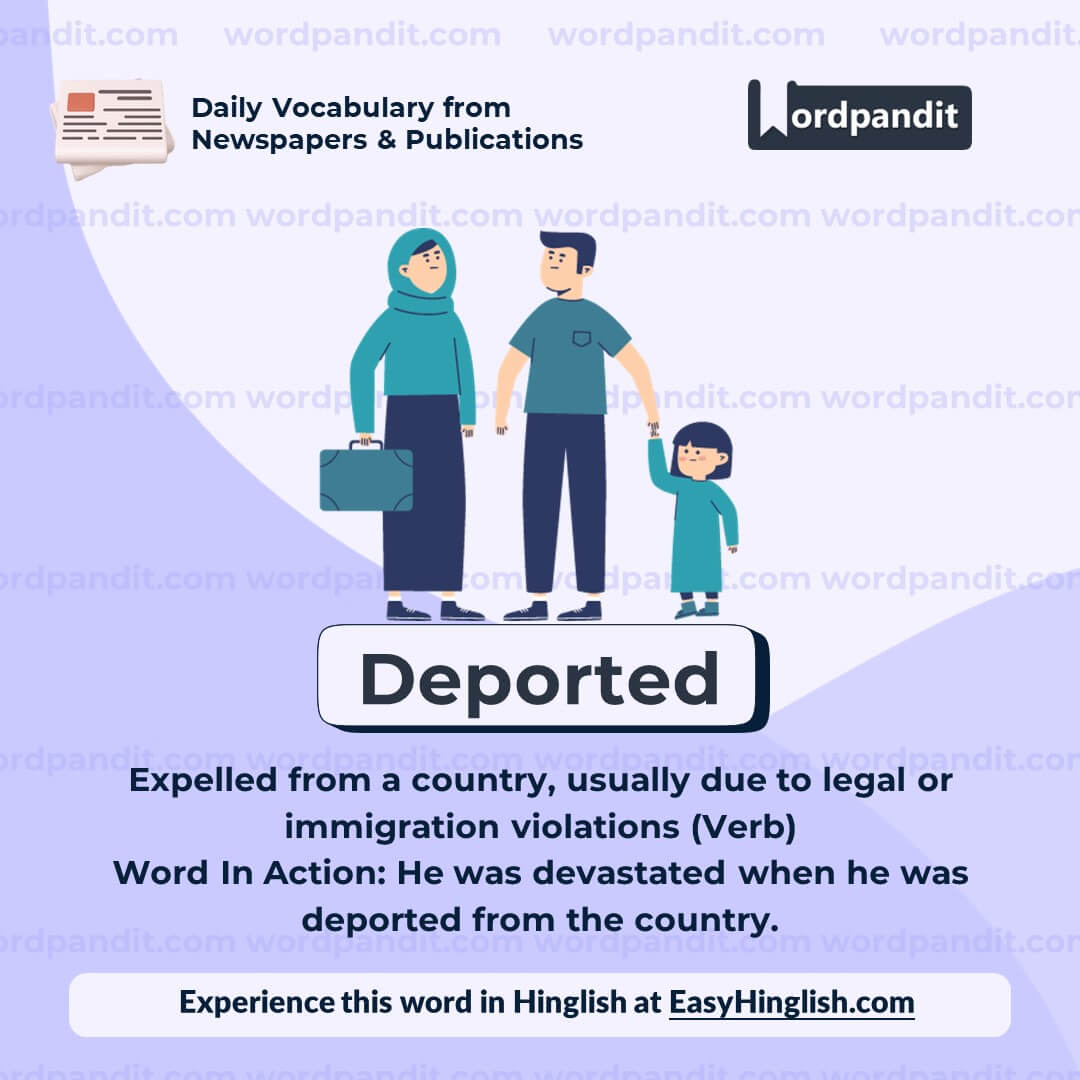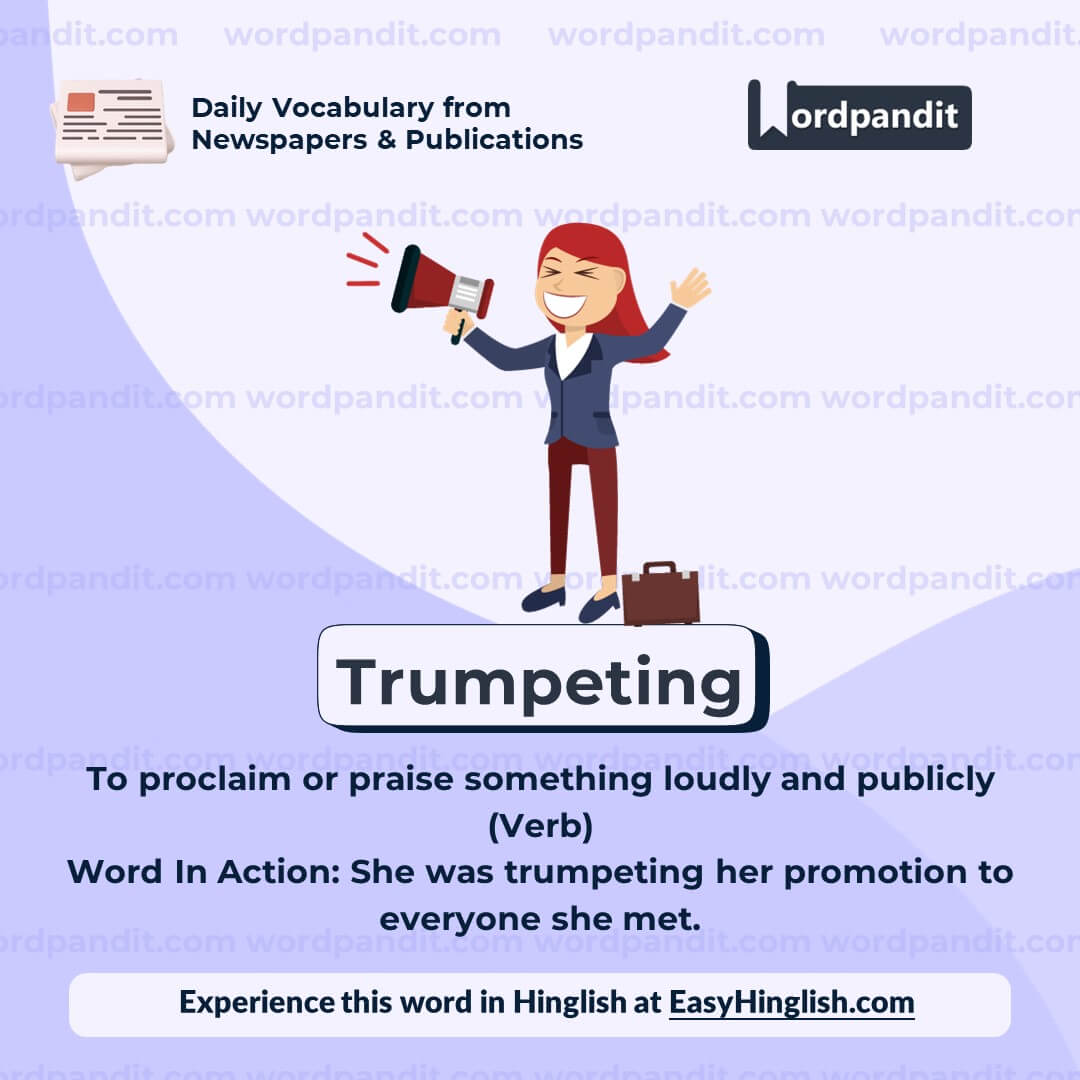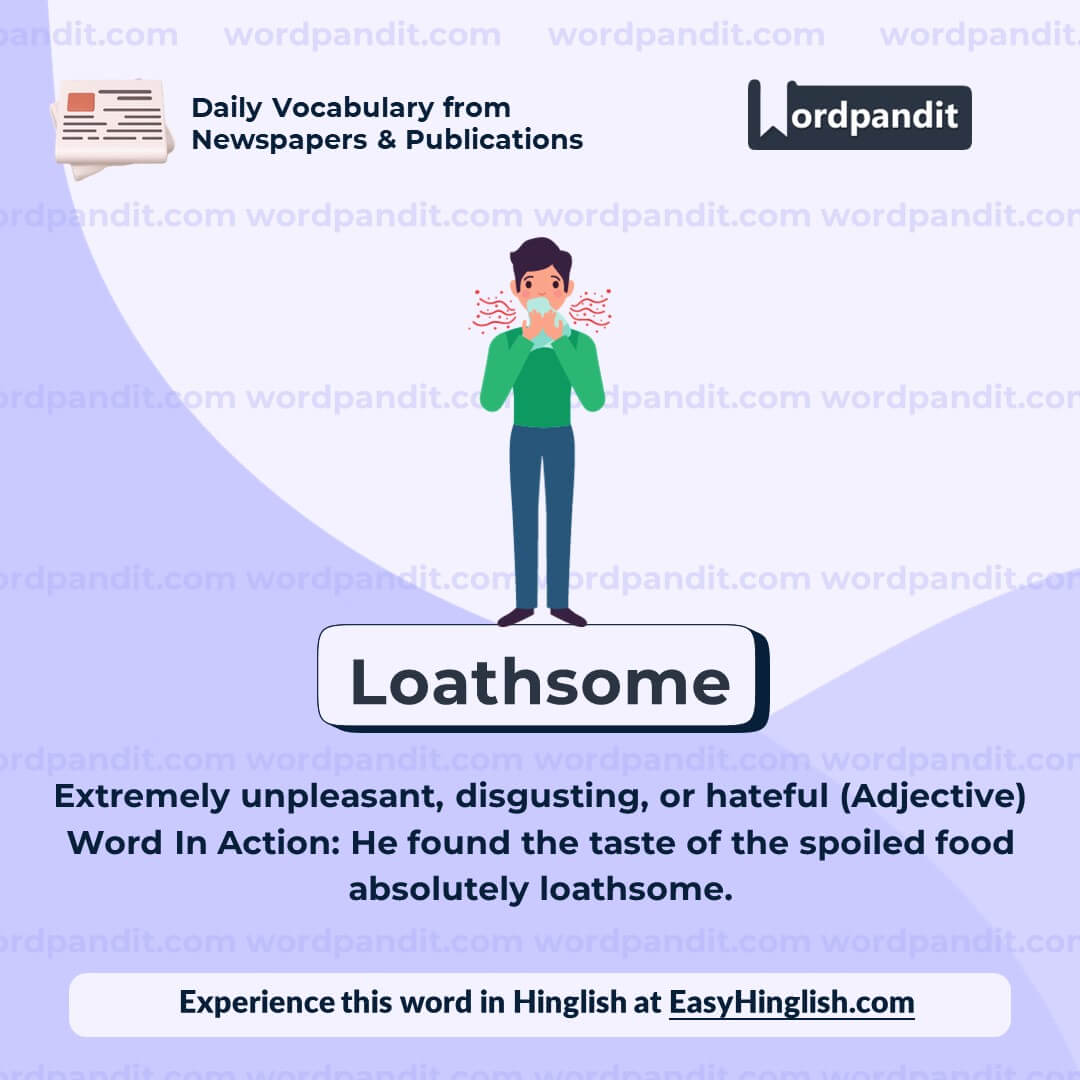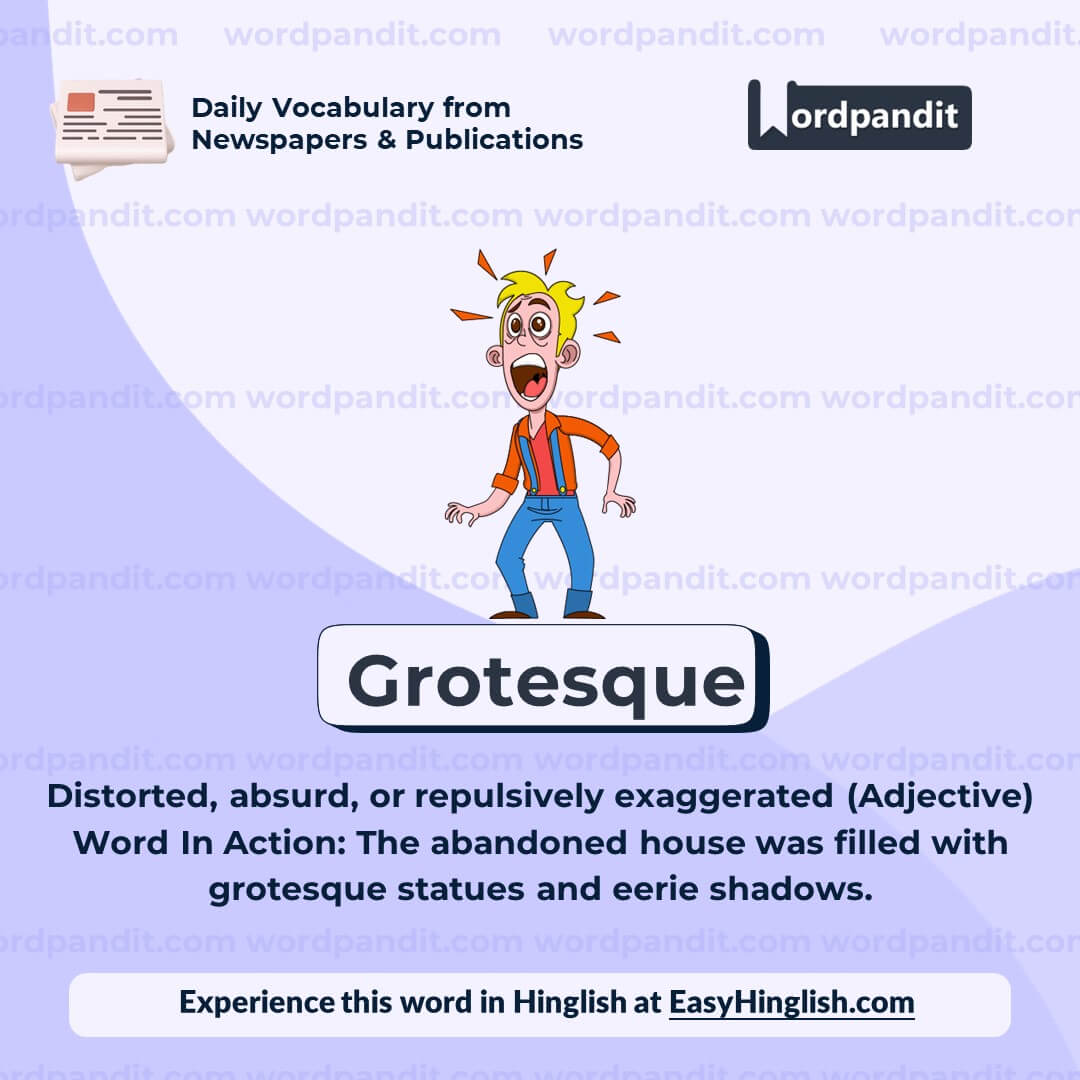Daily Vocabulary from Indian Newspapers and Publications
Welcome to Wordpandit’s Indian Vocabulary Hub
At Wordpandit, we understand the importance of staying rooted in the local context while expanding your language skills. This section focuses on enriching your vocabulary with words and phrases drawn from India’s leading newspapers and publications, ensuring you're learning vocabulary that is practical, relevant, and uniquely Indian.
Why Indian Sources Matter
We believe that the best way to master any language is by immersing yourself in local content. That’s why we carefully curate vocabulary from top Indian publications, including:
- The Hindu
- The Times of India
- The Economic Times
- Hindustan Times
- Live Mint
- The Indian Express
- And many others...
Stay Updated, Stay Relevant
With daily updates from Indian news sources, you’ll be consistently learning words that reflect the trends and shifts in Indian society and culture. Our focus is to provide vocabulary that enhances your understanding of the language in an Indian context.
How Wordpandit Supports Your Goals
Whether you’re preparing for exams, aiming to improve your professional communication, or simply want to stay connected with the latest Indian vocabulary, Wordpandit is here to guide you every step of the way.
Learn with a Practical Approach
Our interactive learning methodology includes real-world examples, engaging activities, and context-specific usage to ensure that every word becomes part of your active vocabulary.
Dive into Indian Vocabulary Today!
Why Choose Wordpandit?
Practical Learning: Focus on words you'll actually encounter in real-world reading, enhancing your comprehension and communication skills.
Diverse Content: From current affairs to scientific breakthroughs, our varied sources expose you to vocabulary across multiple domains.
Effortless Integration: Make Wordpandit a part of your daily routine. Just a few minutes each day can significantly boost your lexicon over time.
Your Path to Vocabulary Mastery
- Visit our Daily Vocabulary section regularly
- Explore new words and their usage in context
- Practice incorporating these words into your own writing and speech
- Track your progress as your vocabulary expands
Start Your Journey Today
Embark on your vocabulary enhancement journey with Wordpandit. By consistently engaging with our daily posts, you'll build a robust vocabulary that serves you well in academic, professional, and personal contexts.
Remember, a word a day keeps linguistic limitations at bay. Make Wordpandit your daily companion in the quest for vocabulary excellence!
WORD-1: Deported
Context:
"That means from 2009 until February 2025, a total of 17,921 Indians have been deported by America." - The Wire
Explanatory Paragraph:
The word "deported" refers to the act of forcefully removing a foreign national from a country, typically due to legal violations or immigration status issues. When a person is deported, they are sent back to their home country or another designated place. Deportation is often carried out by government authorities and can have significant social, legal, and emotional consequences for the individuals involved.
Meaning: Expelled from a country, usually due to legal or immigration violations (Verb)
Pronunciation: dih-PORT-ed
Difficulty Level: ⭐⭐⭐ Intermediate
Etymology: Derived from the Latin word "deportare," meaning "to carry away" or "to banish," later adapted into Old French and then English.
Synonyms & Antonyms:
Synonyms: Expelled, Exiled, Banished, Removed
Antonyms: Admitted, Allowed, Accepted, Welcomed
Usage Examples:
- After living in the country illegally for several years, he was eventually deported by the immigration authorities.
- The government announced new policies to reduce the number of people being deported unfairly.
- Many deported individuals face significant hardships when they return to their home countries.
- Human rights organizations often intervene in cases where individuals are at risk of being unjustly deported.
Cultural Reference:
"The issue of deportation has been widely discussed in global politics, with debates on human rights, national security, and immigration policies shaping public opinion." - Immigration Watch
Think About It:
How do deportation policies impact global migration trends and human rights?
Quick Activity:
Write a short paragraph about how deportation affects families and communities. Use the word "deported" at least twice.
Memory Tip:
Think of "deported" as "de-parted"—someone being forced to depart from a country.
Real-World Application:
The term "deported" is frequently used in legal, political, and social discussions about immigration policies and human rights. Understanding this word is essential for those studying law, international relations, and global affairs.
WORD-2: Viable
Context:
"The team is evaluating whether this new product concept is viable in the market." - The Wire
Explanatory Paragraph:
The word "viable" is used to describe something that is capable of working successfully or being put into practice. It often refers to business ideas, plans, or strategies that have the potential to succeed. In a broader sense, it can also relate to living organisms, meaning something that is able to survive and develop under given conditions.
Meaning: Capable of success or practicality (Adjective)
Pronunciation: VY-uh-bul
Difficulty Level: ⭐⭐ Beginner
Etymology: From the Latin word "vita," meaning "life," and the French word "viable," meaning "capable of life or survival."
Synonyms & Antonyms:
Synonyms: Feasible, Practical, Workable, Realistic
Antonyms: Impractical, Unfeasible, Unrealistic, Impossible
Usage Examples:
- The scientists are working on making solar energy a more viable alternative to fossil fuels.
- Before launching the new app, the company must ensure that it is a viable business model.
- His plan to travel across the country on a bicycle seemed ambitious but not entirely viable.
- The startup struggled in its initial stages but eventually found a viable way to scale its operations.
Cultural Reference:
"Many entrepreneurs face the challenge of turning their ideas into viable businesses, requiring careful planning and execution." - Forbes
Think About It:
What factors determine whether a business idea or project is viable?
Quick Activity:
Think of a new invention or business idea. Write a few sentences explaining why it would or wouldn’t be viable in today's market.
Memory Tip:
Remember "viable" by associating it with "vital"—if something is viable, it has the vitality to survive and succeed.
Real-World Application:
The word "viable" is widely used in business, science, and everyday decision-making. Whether evaluating a startup, a political strategy, or even personal goals, understanding viability helps in making sound choices.
WORD-3: Trumpeting
Context:
"The BJP ridiculed the first for its ‘policy paralysis’, while trumpeting the second as the harbinger of the nation’s Amritkaal (age of the divine elixir/nectar) thanks to the leadership of the Vishwaguru (torch bearer of the world), Narendra Modi." - The Wire
Explanatory Paragraph:
The word "trumpeting" refers to the act of loudly and publicly praising or announcing something with great enthusiasm. It originates from the sound made by a trumpet, which is loud and attention-grabbing. In political and marketing contexts, "trumpeting" often describes exaggerated or boastful promotion of achievements or ideas.
Meaning: To proclaim or praise something loudly and publicly (Verb)
Pronunciation: TRUM-pet-ing
Difficulty Level: ⭐⭐⭐ Intermediate
Etymology: Derived from the noun "trumpet," which comes from Old French "trompette" (small trumpet), referring to the loud and attention-grabbing sound it produces.
Synonyms & Antonyms:
Synonyms: Boasting, Proclaiming, Announcing, Praising, Promoting
Antonyms: Concealing, Downplaying, Understating, Suppressing
Usage Examples:
- The company has been trumpeting its latest product as a revolutionary breakthrough.
- The government is trumpeting its economic reforms ahead of the elections.
- Critics argue that the administration is trumpeting minor achievements to distract from major issues.
- Social media influencers are often seen trumpeting their success stories to attract more followers.
Cultural Reference:
"Political leaders around the world often engage in trumpeting their successes to maintain public support and influence public opinion." - The Economist
Think About It:
When does trumpeting one's achievements become excessive or misleading?
Quick Activity:
Write a short paragraph about a company or politician trumpeting their accomplishments. Use the word "trumpeting" at least once.
Memory Tip:
Think of "trumpeting" like the sound of a trumpet—loud, attention-grabbing, and meant to be heard by everyone.
Real-World Application:
"Trumpeting" is commonly used in media, politics, and business to describe promotional tactics. Recognizing its use helps in analyzing speeches, advertisements, and propaganda strategies.
WORD-4: Loathsome
Context:
"It is particularly humiliating when Trump mentions them with his loathsome body language." - The Wire
Explanatory Paragraph:
The word "loathsome" describes something that causes intense dislike, disgust, or hatred. It is often used to express strong aversion towards a person's behavior, an event, or an object. When something is described as loathsome, it typically provokes feelings of repulsion and deep disapproval.
Meaning: Extremely unpleasant, disgusting, or hateful (Adjective)
Pronunciation: LOHTH-sum
Difficulty Level: ⭐⭐⭐ Intermediate
Etymology: Derived from the Old English word "lath," meaning "hostile or hateful," combined with the suffix "-some," indicating a quality.
Synonyms & Antonyms:
Synonyms: Disgusting, Revolting, Repulsive, Detestable, Abhorrent
Antonyms: Pleasant, Delightful, Appealing, Charming, Enjoyable
Usage Examples:
- The dictator’s loathsome actions led to widespread condemnation from the international community.
- She found the smell of rotten food absolutely loathsome.
- Many consider corruption to be one of the most loathsome aspects of politics.
- The villain in the movie had a loathsome personality that made audiences despise him.
Cultural Reference:
"Throughout history, tyrants and corrupt leaders have been remembered for their loathsome deeds, earning the hatred of the people they ruled." - History Channel
Think About It:
What characteristics or actions make a person truly loathsome, and can such perceptions change over time?
Quick Activity:
Write a sentence describing a loathsome character in a book or movie. Use the word "loathsome" effectively.
Memory Tip:
Think of "loathsome" as something you absolutely "loathe"—something so disgusting that you can’t stand it.
Real-World Application:
"Loathsome" is a powerful word used in journalism, literature, and everyday speech to emphasize strong negative feelings. Recognizing it helps in understanding passionate expressions of disapproval in news, debates, and discussions.
WORD-5: Grotesque
Context:
"As such, Modi’s personalised diplomacy, conducted at the cost of India’s well-groomed institutionalised diplomacy, runs the risk of faltering in the face of Donald Trump, an even more grotesque version of Narendra Modi." - The Wire
Explanatory Paragraph:
The word "grotesque" describes something that is distorted, bizarre, or absurdly exaggerated, often to the point of being shocking or repulsive. It is frequently used to describe physical appearances, behaviors, or ideas that seem unnatural or disturbingly odd. In literature and art, "grotesque" can also refer to a mix of the fantastical and the horrifying.
Meaning: Distorted, absurd, or repulsively exaggerated (Adjective)
Pronunciation: groh-TESK
Difficulty Level: ⭐⭐⭐ Intermediate
Etymology: From the Italian "grottesca," meaning "of a cave" or "grotto," originally used to describe bizarre or unnatural art found in ancient Roman ruins.
Synonyms & Antonyms:
Synonyms: Bizarre, Distorted, Monstrous, Hideous, Absurd
Antonyms: Normal, Beautiful, Elegant, Harmonious, Pleasant
Usage Examples:
- The horror movie featured grotesque creatures with deformed faces and twisted limbs.
- His grotesque sense of humor made many people uncomfortable.
- The dictator's grotesque display of power shocked the international community.
- The artist's paintings often feature grotesque depictions of human emotions and fears.
Cultural Reference:
"The works of Gothic literature, such as Mary Shelley's Frankenstein and Edgar Allan Poe’s stories, often feature grotesque characters and eerie settings that provoke both horror and fascination." - Literary Journal
Think About It:
Why do grotesque characters and themes often appear in horror and satire? What effect do they have on the audience?
Quick Activity:
Write a short description of a grotesque character in a story or movie. Use vivid details to highlight their exaggerated features or behaviors.
Memory Tip:
Think of "grotesque" as something so exaggerated or bizarre that it almost seems like a twisted, unnatural piece of art.
Real-World Application:
The word "grotesque" is frequently used in literature, art, and political commentary to describe bizarre, exaggerated, or disturbing elements. Recognizing its use helps in understanding satire, criticism, and creative expression.

















